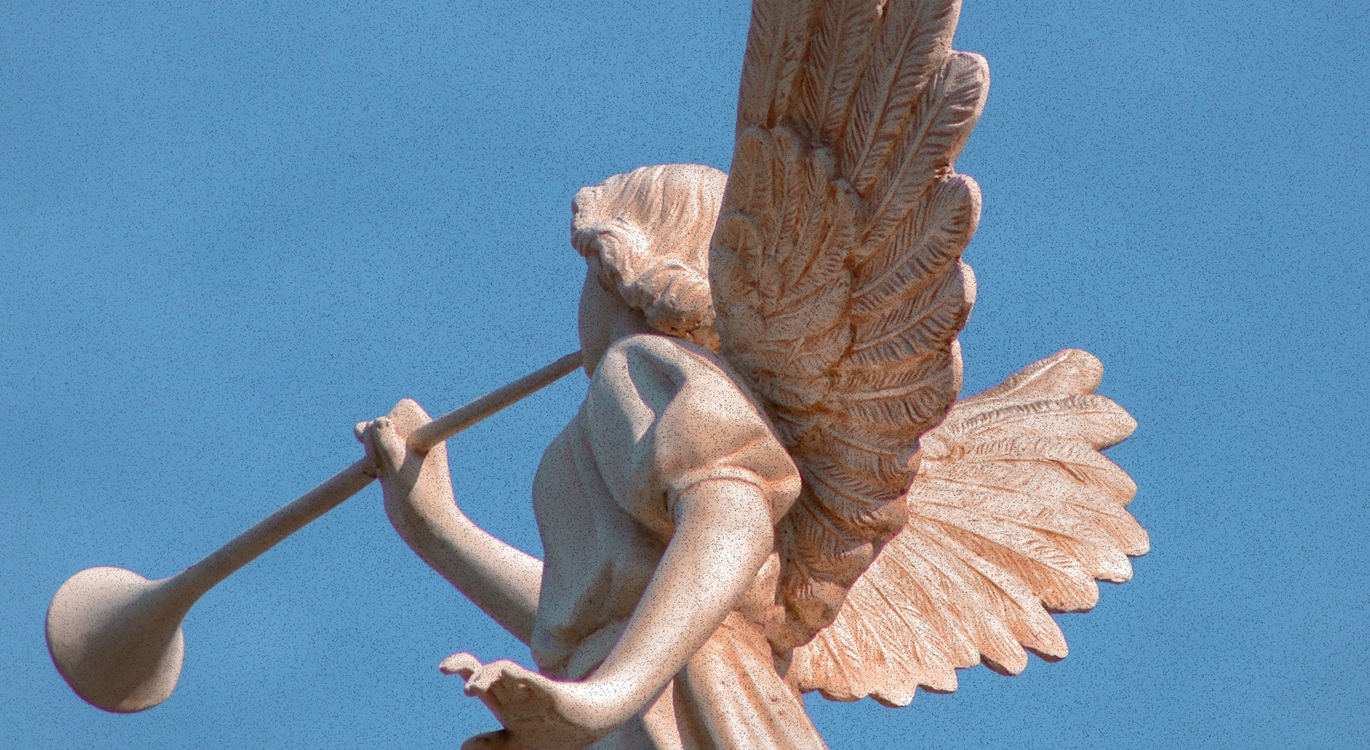The writer has already mentioned two divisions of time in the Hebrew letter. He has spoken of a “time past”, that is, when the prophets spoke (1:1). He has referred to “these last days”, that is, now that Christ is revealed (1:2). Now he mentions “the world to come” (2:5).
The “world to come” refers to the millennial kingdom which will be set up on earth in the future. The Old Testament is full of glimpses and promises of this coming day of glory, when Messiah, the true Son of David, rules in Jerusalem. Then Israel will enjoy her earthly inheritance, and will be the head of the nations. Scripture envisages a glorious age when the nations come up to Jerusalem to worship the LORD and when “the knowledge of the glory of the LORD” covers the earth “as the waters cover the sea” (Habakkuk 2:14).
This “world to come” has already been mentioned in Hebrews 1:6: when God again brings His Firstborn into the “world” (same word, oikoumene – 3625) then all the angels will worship Him.
The writer teaches two important things about the coming kingdom age in the rest of this chapter. Firstly, mankind will rule the world. The coming age belongs to man, not the angels. Man will be sovereign. Secondly, Jesus will lead us into this salvation as the Pioneer. So this is brought about by one Man – Jesus – who enters humanity to triumph over death and the devil through His suffering and sacrifice, and leads redeemed humans into the fullness of their salvation in this coming age.
(I) Mankind will rule the world (Hebrews 2:5-9)
“For He has not put the world to come, of which we speak, in subjection to angels” (2:5).
God has not put angels in authority in the “world to come”. Angels were rather servants helping the human heirs who will enter into the fullness of their salvation in this “world to come” (1:14).
“But one testified in a certain place, saying: “What is man that You are mindful of him, or the son of man that you take care of him? You have made him a little lower than the angels; You have crowned him with glory and honour, and set him over the works of Your hands. You have put all things in subjection under his feet.” For in that He put all in subjection under him, He left nothing that is not put under him. But now we do not yet see all things put under him” (2:6-8).
God created mankind for rule in His creation. In Genesis 1:26-27 we learn that God created man in His image and after His likeness and said, “let them have dominion.” God’s first thought is His final thought – man is destined to rule – but we don’t see that happening yet. The first man failed, forfeiting the position of dominion he had been given; God’s fair creation was disordered (cp. Romans 8:20). Mankind is still not in his exalted place today, but he will rule when God puts everything back into its proper order.
The guarantee that this will take place is that there is a man on the throne of God – Jesus!
“But we see Jesus, who was made a little lower than the angels, for the suffering of death crowned with glory and honour, that He, by the grace of God, might taste death for everyone” (2:9).
Jesus entered into humanity, and was made a little lower than the angels. He has now, because of the suffering of death, been crowned with glory and honour. He became a man that he might suffer and taste death so that redeemed humanity might one day reign for God in this world, unimpeded by the spectre of death itself. The great barrier to man fulfilling God’s purpose for Him is sin and death – and yet through Christ both of these problems are solved. He tastes death for everyone (2:9) and He makes propitiation for the sins of the people (2:17).
In chapter one the Son of God is seen in His solitary dignity and glory, but in chapter two we see Him uniting Himself with a company of redeemed people.
How will mankind come into the good of this great inheritance in the coming world? How will they rule? That can only come about because of the incarnation of the Son of God. He became man that we might reign with Him (see Revelation 1:6; 5:9).
(II) Jesus will lead us into our Salvation as the Pioneer (Hebrews 2:10-18)
“For it was fitting for Him, for whom are all things and by whom are all things, in bringing many sons to glory, to make the captain of their salvation perfect through sufferings. For both He who sanctifies and those who are being sanctified are all of one, for which reason He is not ashamed to call them brethren, saying: ‘I will declare Your name to My brethren; in the midst of the assembly I will sing praise to You.’ And again: ‘I will put my trust in Him.’ And again: ‘Here am I and the children whom God has given Me’” (2:10-13).
As the One who caused all things, and is the agent behind it all, God saw it as appropriate, in bringing many sons to glory, to make the captain of their salvation perfect through sufferings. The idea behind “captain” seems to be that of a “Pioneer”. He is the One who goes before or in front to bring others with Him. In God’s all-wise and sovereign purpose the method that He used to bring about this salvation for broken sinful mankind was to send Jesus into humanity, to allow Him to suffer, thus perfectly equipping him for his role as Captain of their salvation.
He identifies with His people by setting them apart with Himself. Now we have one company, we might even say one family, as they are all of one Father. This is why He is not ashamed to call them brethren.
Three Old Testament passages are used to confirm and unpack the details of His relationship with “the children”. As believers, we can delight in these wonderful truths, which include: His unity with His people; His revelation of His Father to His brethren; His leading of the praise in the gathered assembly; His identity with the pathway of faith; and His fruitfulness in a family expressing God’s purpose.
Psalm 22:22a, “I will declare Your name unto my brethren . . .”, is wonderfully fulfilled in John 20:17:
“Jesus said to her, ‘Do not cling to Me, for I have not yet ascended to My Father; but go to My brethren and say to them, “I am ascending to My Father and your Father, and to My God and your God.”’”
In Isaiah 8:17, “I will put my trust in Him”, we have the clear identifying of the Lord Jesus with His people on the pathway of faith (see also Hebrews 12:2), and Isaiah 8:18, “I and the children which God has given me”, is a reference initially to Isaiah the prophet, but looks forward to God’s purpose in uniting a family of believers to the Messiah, God’s Anointed One.
All this emphasizes just how close to His people the Messiah has become.
“Inasmuch then as the children have partaken of flesh and blood, He Himself likewise shared in the same, that through death He might destroy him who had the power of death, that is, the devil, and release those who through fear of death were all their lifetime subject to bondage” (2:14-15).
Two great barriers stood in the way of “the children” ever entering into their inheritance and fully experiencing what God had for them. The barriers were death and the devil.
Paul writes, in 1 Corinthians 15:50,“Now this I say, brethren, that flesh and blood cannot inherit the kingdom of God; nor does corruption inherit incorruption.”
If this be so, then death must be defeated and the devil, like Goliath, must be slain by his own sword. That is why the Son of God shared “flesh and blood”. It was the only way. As David descended into the Valley of Elah (see 1 Samuel 17), so Jesus descended into the valley (of death) and defeated the awful foe, using the devil’s own weapon of death against him.
This has released those who through fear of death were all their lifetime subject to bondage. He has triumphed by emerging from this valley having “rendered powerless” the devil.
“For indeed He does not give aid to angels, but He does give aid to the seed of Abraham. Therefore, in all things He had to be made like His brethren, that He might be a merciful and faithful High Priest in things pertaining to God, to make propitiation for the sins of the people. For in that He Himself has suffered, being tempted, He is able to aid those who are tempted” (2:16-18).
So, we see that mankind is the focus; God doesn’t give this aid to angels (they aren’t the target of such grace) but He does give aid to the seed of Abraham. The “seed of Abraham” are those who place their trust in the Lord, as Abraham did (cp. Romans 4:16-17).[1]
In summary, the writer concludes that Christ had to be made like His brethren in all things; He must enter into humanity, stoop lower than the angels, and experience suffering and death, so that He could fulfil his role, not just of being the great captain of their salvation but also a merciful and faithful high priest.
To be merciful and faithful “in the service of God” (ESV) the Lord Jesus must stoop into death to make propitiation for the sins of the people, i.e. to satisfy God’s righteous demands against their sins by means of a sacrifice. There was no other way for God’s pity to be demonstrated and His character vindicated.
Christ’s sacrifice, as it satisfies God’s demands, opens the way for God’s people into His presence, and Christ’s sufferings in His life, when He faced trials and temptation, uniquely equips Him to bring help to those similarly tested. Thus the high priest’s role of sacrifice and sympathy are seen beautifully fulfilled in Him. All this will be developed in more detail as we move through the letter.
[1] F. W. Grant is helpful here: “All this is in language which an Israelite would well understand; but the seed of Abraham, the people, are to be seen in the light of Christianity as the company of faith. If Israel nationally answered to this description, then, of course, they could claim as such the old promises; but even here not exclusively, for the apostle's words, that "they which are of faith, the same are the children of Abraham," must necessarily apply at all times and under all circumstances.” (F. W. Grant; Numerical Bible)



